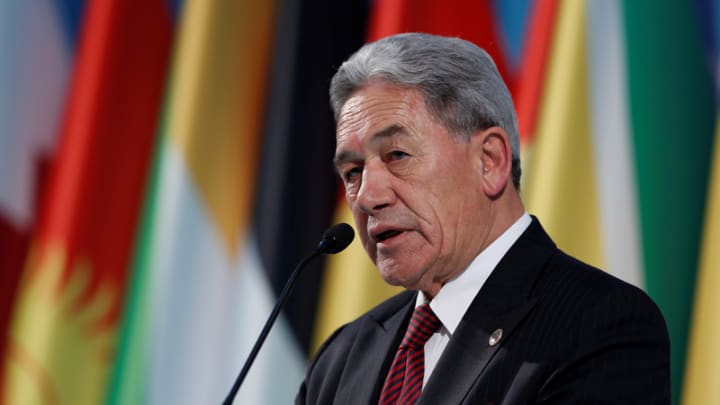
CANBERRA — In an address to the Center for Strategic and International Studies in Washington, D.C., on July 16, New Zealand Foreign Minister Winston Peters called for the United States to reestablish ties with the Pacific for improved trade and economic opportunities — warning of the impact of the changing geopolitics in the region.
“We ourselves, dare I say it, along with Australia and the U.S. and others, had taken our eyes off the area of our nearest neighborhood — the Pacific — and that there are consequences for that,” Peters told the audience.
Chinese influence was one of the results, as well as a reduced capacity for economic growth in the Pacific, he said.
Civil society criticizes secretive Asia-Pacific free trade negotiations
Ongoing negotiations for a free trade agreement between ASEAN and Indo-Pacific countries continue to raise concern among CSOs on the potential for negative social and environmental impacts.
Peters’ address coincided with a visit to Washington to lead a delegate attending the Ministerial to Advance Religious Freedom, as well as to discuss opportunities for trade agreement including U.S. reengagement in the Trans-Pacific Partnership as well as a bilateral agreement between the U.S. and New Zealand.
“At last year’s sixth US-ASEAN summit Vice President [Mike] Pence conveyed President [Donald] Trump’s offer to make bilateral trade agreements with any Indo-Pacific nation that wants to be our partner and that will abide by the principles of fair and reciprocal trade,” Peters said. “We stand here to say New Zealand is uniquely ready in our fulsome record and attitude to free and fair trade to take up the President’s offer.”
“The United States’ limited engagement in trade agreements in the Indo-Pacific is of real concern to New Zealand.”
— Winston Peters, New Zealand Foreign MinisterAn agreement with New Zealand aims to fill Pacific gaps
“The United States’ limited engagement in trade agreements in the Indo-Pacific is of real concern to New Zealand,” Winston said in his address, putting forward the case for a trade partnership.
In the past 20 years, he said, the U.S. had only negotiated three free trade agreements in Asia — agreements with Australia, South Korea, and Singapore.
“While these are significant countries in the region, they are by no means the biggest economies,” he said. “In fact, taken together these three countries represent just 12% of Asia’s GDP.”
Niue, a tiny island nation in the Pacific, is ADB's newest member
This tiny Pacific island has been receiving quite the attention from neighboring donors.
In comparison, he said the “staggering economic growth of China” was achieved through greater engagement across Asia, cemented through trade agreements. For the U.S., this means its economic influence in the region is waning.
“The trend of US exports to New Zealand is a case in point,” he said. “Although New Zealand and the US enjoy a strong economic relationship, the reality is that the United States’ share of exports to New Zealand has been declining. This is consistent with the broader trend for US exports to the Asian region.”
Across Asia, he said the U.S. share of imports fell from 17.4% in 1990 to 7.4% in 2018 — losing half of its market share. In comparison, China’s exports to New Zealand have grown on average by 17% each year.
Despite developing strategies for greater engagement in the region — including an Indo-Pacific strategy recently released by the U.S. Department of Defense — Peters said the perspective from the region was on European engagement and partnerships, and a new agreement with New Zealand would help change this perspective.
What New Zealand wants in partners — for trade and aid
The session not only enabled Peters to put forward a pitch for Pacific trade agreements but also explain how they would like partnerships to operate — for trade and other opportunities including the aid program.
“Partners need to support each other economically — through free trade and by understanding each other’s economic imperatives — because only by doing so can we achieve our collective ambitions to strengthen the economic engines that drive our mutual ambitions to lead, compete better and, ultimately, see the Pacific region and each other prosper,” he said.
Engagement with China, he said, aims to be “free and open” but with rules that underpin China’s own focus. On aid programs, this means putting the interests of local people in the recipient country first, not New Zealand or China. Peters explained that all New Zealand aid programs are untied to ensure the recipient knows the focus is advancing their cause.
“That makes us slightly unique in the Pacific, dare I say it, because other countries expect their foreign aid connections — if it requires service or other contracts — to be offered first to the economy of the country making the donation in the first place,” he said.
Despite this clear objective, Peters acknowledged juggling priorities has meant it has been difficult to achieve. “It has not always, to be honest with you, been successful and a number of projects have not gone as well as they should have gone.”
And while the challenges of the Pacific region are broad — with economics, education, health, politics, environment, gender relations some of the challenges it faces — Peters said that the immediate focus should be on infrastructure to build the capacity for economic development in the region.
But importantly Peters said it was important to seek partners work in collaboration — not competition — to achieve more who would listen to and support the needs of Pacific Islanders who have called the region home for thousands of years.
“Respect is the number one thing they want,” he said.




